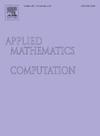进化博弈视角下考虑双重社会强化效应的多信息扩散模型研究
IF 3.5
2区 数学
Q1 MATHEMATICS, APPLIED
引用次数: 0
摘要
在线社交网络中多种信息的动态交互对信息传播趋势的理解和预测提出了新的挑战,特别是用户面对多种信息时的有限理性决策。本文引入进化博弈论来分析用户在不同信息下的策略。利用费米函数计算网民的模仿概率,考虑信息的吸引力和双重社会强化效应,建立了一类G-SFDFRR多信息延迟传播模型。采用新一代矩阵法计算了传播阈值,并利用时滞Lyapunov函数分析了系统的全局渐近稳定性。基于Twitter数据集的实证分析验证了该模型的有效性,与SCIR和SICMR模型相比,拟合程度分别提高了38.91%和19.21%。进一步通过数值计算进行定量分析,发现进化博弈可以延缓信息传播的高峰,加速谣言的衰落,凸显了战略互动在遏制谣言传播中的关键作用。此外,调节正、负社会强化效应和传播概率可以优化辟谣效果,短期强制沉默措施比长期强制沉默措施更有效。本文章由计算机程序翻译,如有差异,请以英文原文为准。
A study on multi-information diffusion model considering dual social reinforcement effect from the perspective of evolutionary game
The dynamic interactions of multi-information in online social networks present new challenges for understanding and forecasting information dissemination trends, especially the bounded rational decision-making of users when faced with various information. This article introduces evolutionary game theory to analyze user strategies amidst varying information. By using the Fermi function to calculate the imitation probability of netizens and considering the attractiveness of information and the dual social reinforcement effect, a class of G-SFDFRR multi-information delay propagation models has been established. The propagation threshold is calculated using the next-generation matrix method, and the global asymptotic stability of the system is analyzed using the time-delay Lyapunov function. Empirical analysis based on a Twitter dataset validated the model's effectiveness, showing an improvement in the fitting degree of 38.91 and 19.21 % over the SCIR and SICMR models, respectively. Further quantitative analysis through numerical calculations revealed that evolutionary games can delay the peak of information dissemination and accelerate the decline of rumors, highlighting the key role of strategic interaction in curbing rumor spread. Additionally, regulating the positive and negative social reinforcement effects and propagation probabilities can optimize the effect of rumor refutation, with short-term forced silence measures being more effective than long-term ones.
求助全文
通过发布文献求助,成功后即可免费获取论文全文。
去求助
来源期刊
CiteScore
7.90
自引率
10.00%
发文量
755
审稿时长
36 days
期刊介绍:
Applied Mathematics and Computation addresses work at the interface between applied mathematics, numerical computation, and applications of systems – oriented ideas to the physical, biological, social, and behavioral sciences, and emphasizes papers of a computational nature focusing on new algorithms, their analysis and numerical results.
In addition to presenting research papers, Applied Mathematics and Computation publishes review articles and single–topics issues.

 求助内容:
求助内容: 应助结果提醒方式:
应助结果提醒方式:


